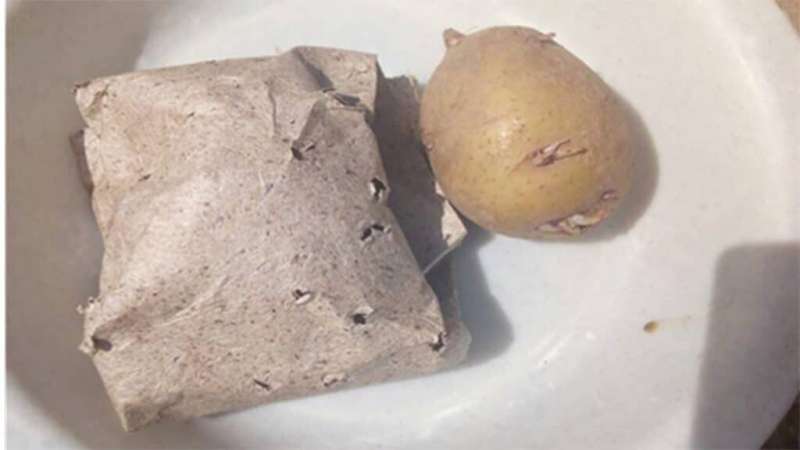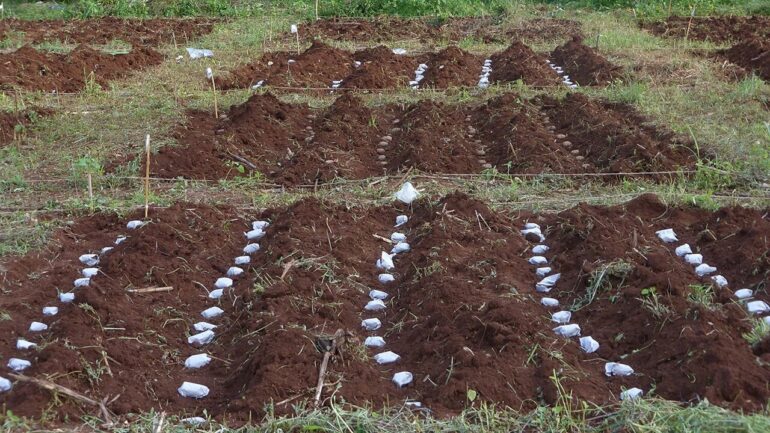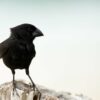Wrapping potato seeds in biodegradable paper made from unusable parts of banana plants reduces the infestation and harmful effects of a nasty plant pathogen—a worm called the potato cyst nematode—and sharply increases potato size and yields.
Reported in Nature Sustainability, a recent study shows the banana paper helps disrupt signals between the plant and the worm, blocking pathogen infestation and growth. Potato seeds planted inside the paper—with and without miniscule amounts of a worm-killing chemical called abamectin—grew larger and more abundantly than potatoes planted without the paper or in fields sprayed with abamectin alone.
Potato yields were up to five times larger than controls when the banana paper was dosed with 100 nanograms of abamectin—a tiny fraction of the amount normally sprayed on fields by farmers to protect potatoes.
“We knew that the banana paper would be successful, but not to this extent,” said Charles Opperman, a co-corresponding author of the study and professor of plant pathology at North Carolina State University. “We previously had some success increasing yam yields in Benin using this ‘wrap-and-plant’ method, but nothing on the order reported here with potato.”
Potato cyst nematodes are a global scourge that can cause severe damage to potatoes; in some areas in Africa potato yields declined by 60% after infestation, the researchers say.
The paper was made in NC State’s Department of Forest Biomaterials from the aqueous slurry of banana waste product, said Tahira Pirzada, a study co-author and postdoctoral research scholar in NC State’s Department of Chemical and Biomolecular Engineering. When the water is removed from the slurry, long sheets of flexible banana paper are formed. A paper cutter is used to trim the paper into small pieces that can wrap around potato seeds; those packages are then planted.

A banana paper potato “package” successfully thwarts the potato cyst nematode in African field tests. © Laura Cortada
In field tests designed to test the banana paper’s efficacy against the potato cyst nematode, researchers in Kenya grew potatoes four different ways: wrapped in banana paper dosed with low doses of abamectin; wrapped in banana paper without abamectin; without any banana paper but in fields sprayed with abamectin; and in control fields without banana paper wraps or chemical treatment.
The results showed that the banana paper—with or without the worm-killing chemical—effectively prevented potato infestation in the field and increased potato yields and size. Potato root systems also were more dense when paper was utilized.
To further test the paper’s role, the researchers also performed lab studies that exposed the pathogen to the chemicals released from the potato plant’s roots, known as the root exudate, with and without the banana paper. Juliet Ochola, the study’s lead author who worked on the lab studies in Kenya and is now an NC State Ph.D. student in plant pathology, said the banana paper adsorbed these chemicals and held them fast.
“Nematodes love these chemicals; they stimulate the nematode’s growing process and inform the nematode about the best locations to infect the plant,” Ochola said. “But the banana paper—with or without doses of abamectin—disrupts the signaling between the potato and the nematode. The nematode can’t detect those compounds, so it doesn’t grow and it doesn’t know where to infect the plant.”
The researchers are currently testing the “wrap-and-plant” technique on other vegetable crops, including yams, sweet potatoes and cassava, and are looking to commercialize the technology, which could drive economic development in Africa.
“The beauty of this approach is that it is straightforward, inexpensive and sustainable; farmers can adopt it on a smaller scale,” Pirzada said. “No chemicals are used in the paper-making process. This is the way forward.”
More information:
Juliet Ochola et al, Wrap-and-plant technology to manage sustainably potato cyst nematodes in East Africa, Nature Sustainability (2022). DOI: 10.1038/s41893-022-00852-5
Provided by
North Carolina State University
Citation:
Paper made from banana plants stymies potato pest (2022, March 8)



